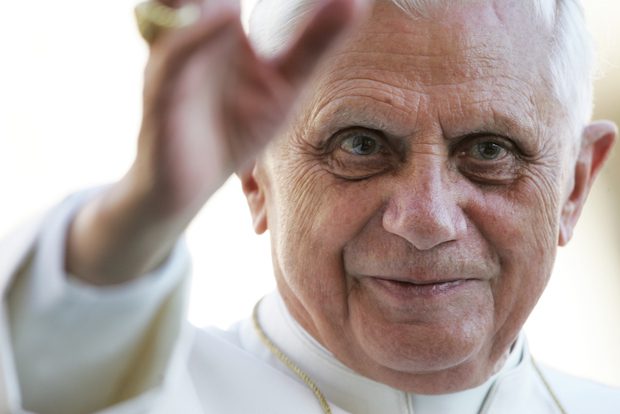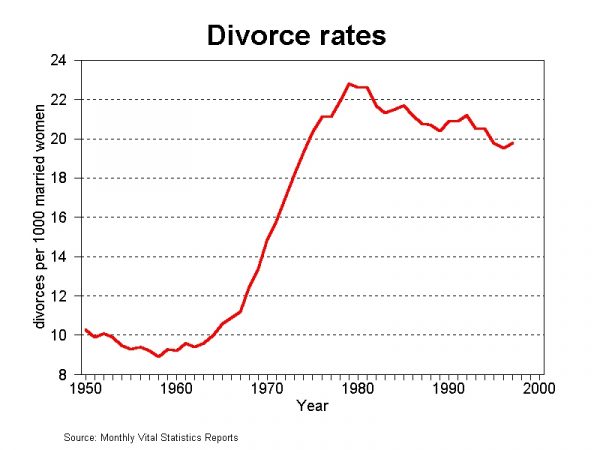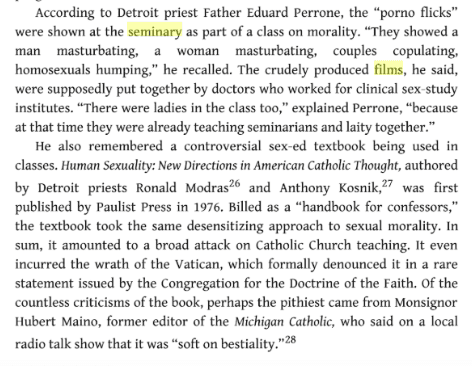Further Reflections On BXVI’s Essay

There has been a lot of poking fun at Benedict XVI for “blaming the Sixties” for the sex abuse crisis. But at least one progressive Catholic — Pope Francis’s biographer — says that BXVI has a point:
Of course that’s true. But you can’t ignore the astonishing spike in clerical abuse in the 1960s-80s. This chart from John Jay 2004 report is reproduced by every other major report (Australia, Germany etc.) & cries out for an explanation. pic.twitter.com/tmppFmuNEh
— Austen Ivereigh (@austeni) April 12, 2019
https://platform.twitter.com/widgets.js
It does. BXVI is not “blaming the Sixties” entirely for what happened. He’s not a stupid man. He is saying — accurately — that there was a general collapse in sexual morality across the West in that time, and that the Church was not immune to it at all.
Is he saying that there was no pederasty in the Church prior to the 1960s? Of course not! But something happened in the late 1960s and through the 1970s that changed things dramatically. It was a release from old bonds, and the idea of bonds. As one of this blog’s readers wrote in a comment about the modern era:
” No, we’ve submitted to ourselves. You’ve argued modern secularists are committed to doing what they each believe will make them happiest. That is submission”
Another measure of the submission to ourselves in the same era:

This is the broader context in which the clerical sex abuse scandal became much worse. Society really was falling apart on sexual morality. The Church, which ought to have held firm, fell apart with it. BXVI is not using this as an excuse, but as part of an explanation.
In his letter, Benedict is harsh on the failures of the institutional Church on this front. He mentions a seminary rector who screened porn for his seminarians. That rector was eventually made a bishop. In this blog post, quoting from Michael S. Rose’s book Goodbye, Good Men, Lee Podles outs this bishop as Kenneth Untener of Saginaw:

Rose points out — this is in Untener’s Wikipedia entry too — that Untener was called to the Vatican to defend the porn movies strategy to Pope John Paul II. With the help of Detroit’s Cardinal Dearden, he must have been successful, because the Pope approved his consecration. One glaring omission in Benedict XVI’s account is the terrible management of the episcopate by John Paul II and, in some cases, by himself.
The Catholic actor Kevin O’Brien has a good reflection on the Benedict letter. Excerpt:
In fact, the theologians Benedict refers to in his essay (some of whom he names) who are intent on denying the objectivity of Goodness; who insist that morality is whatever works best for us in any given situation; who become indignant at any check on the culture of “release” – these theologians are leading the little ones astray. And this includes such armchair theologians as (perhaps) your music minister, your “liturgist”, your CCD teacher, and any other heterodox Catholics who proudly bear wild grapes in what used to be a vineyard but is now a mixture of briar patch and trash heap. In fact, chances are you are being led astray by your pastor and your bishop, as well.
But we have a right to the Faith! And canon law should protect this right. Benedict insists upon this. “Canon law that corresponds to the whole of Jesus’ message must therefore … also protect the Faith, which is also an important legal asset.”
However …
In the general awareness of the law, the Faith no longer appears to have the rank of a good requiring protection. This is an alarming situation which must be considered and taken seriously by the pastors of the Church.
What astonishes me about this essay is that Benedict is speaking with the voice of the Church – a voice that has been silent on this matter for at least seventeen years.
The Abuse Scandal grew up in a clerical culture that was antichristian. That’s a fact. That’s obviously not the whole explanation for the Scandal, and it is certainly not an excuse, as some are portraying it – and orthodox and traditionalist clergy have been abusers as have heterodox and liberal ones. But the encouragement of indulgence is a problem. Such an atmosphere does not breed saints.
The gardeners were deliberately destroying the garden. They were sowing and cultivating weeds. They still are, many of them.
And yet Benedict, in this essay, has at least repaired the hedge – if only by pointing out where it once stood – and where (with our hard work and with God’s grace) it will stand again.
This, I believe, is why these short bits from BXVI’s missive are so important:
Faith is a journey and a way of life. In the old Church, the catechumenate was created as a habitat against an increasingly demoralized culture, in which the distinctive and fresh aspects of the Christian way of life were practiced and at the same time protected from the common way of life. I think that even today something like catechumenal communities are necessary so that Christian life can assert itself in its own way.
… Today’s Church is more than ever a “Church of the Martyrs” and thus a witness to the living God. If we look around and listen with an attentive heart, we can find witnesses everywhere today, especially among ordinary people, but also in the high ranks of the Church, who stand up for God with their life and suffering. It is an inertia of the heart that leads us to not wish to recognize them. One of the great and essential tasks of our evangelization is, as far as we can, to establish habitats of Faith and, above all, to find and recognize them.
I live in a house, in a small community of people who discover such witnesses of the living God again and again in everyday life and who joyfully point this out to me as well. To see and find the living Church is a wonderful task which strengthens us and makes us joyful in our Faith time and again.
Of course the author of The Benedict Option is going to be drawn to those passages, especially in light of the extraordinary speech BXVI’s personal secretary, Archbishop Georg Gänswein, delivered about the Ben Op last autumn in Rome. (An Italian present there told me afterward, “You can be confident that every syllable of that speech was seen first by Benedict.”) Here, Benedict XVI is telling us that we need small communities of believers who are really convinced, not only for our own formation, but as part of our evangelization efforts. BXVI says in his essay:
If we really wanted to summarize very briefly the content of the Faith as laid down in the Bible, we might do so by saying that the Lord has initiated a narrative of love with us and wants to subsume all creation in it. The counterforce against evil, which threatens us and the whole world, can ultimately only consist in our entering into this love. It is the real counterforce against evil. The power of evil arises from our refusal to love God. He who entrusts himself to the love of God is redeemed. Our being not redeemed is a consequence of our inability to love God. Learning to love God is therefore the path of human redemption.
He goes on:
A paramount task, which must result from the moral upheavals of our time, is that we ourselves once again begin to live by God and unto Him. Above all, we ourselves must learn again to recognize God as the foundation of our life instead of leaving Him aside as a somehow ineffective phrase. I will never forget the warning that the great theologian Hans Urs von Balthasar once wrote to me on one of his letter cards. “Do not presuppose the triune God, Father, Son and Holy Spirit, but present them!”
Indeed, in theology God is often taken for granted as a matter of course, but concretely one does not deal with Him. The theme of God seems so unreal, so far removed from the things that concern us. And yet everything becomes different if one does not presuppose but present God. Not somehow leaving Him in the background, but recognizing Him as the center of our thoughts, words and actions.
As I write in The Benedict Option, this is what we lay Christians have to re-learn. We have to orient our entire lives around God, and do so in communities of Christians who share the same commitment. We can no longer presume God; we have to present him, first of all to ourselves. Remember what church historian Robert Louis Wilken said:
Nothing is more needful today than the survival of Christian culture, because in recent generations this culture has become dangerously thin. At this moment in the Church’s history in this country (and in the West more generally) it is less urgent to convince the alternative culture in which we live of the truth of Christ than it is for the Church to tell itself its own story and to nurture its own life, the culture of the city of God, the Christian republic. This is not going to happen without a rebirth of moral and spiritual discipline and a resolute effort on the part of Christians to comprehend and to defend the remnants of Christian culture.
What Benedict XVI is saying here is that in a time of corruption and widespread loss of faith both outside the institutional Church and within it, believers need to rediscover God, the God who is Love, and make Him present in their own lives, and in the communities where they live. They — we — need this concrete encounter with God’s love, manifest in the lives of fellow believers. Think about it: the greatest theologian who ever sat on the Petrine throne is telling the world that he himself finds the strength to carry on through this crisis by his daily encounters with the tiny group of faithful believers who live with him in his retirement quarters. It really is that simple. It’s what Joseph Ratzinger himself is doing!
Benedict says this is a “church of the martyrs” now. He’s talking about people willing to suffer for the faith, but he’s also talking about martyrs in the literal sense of “witnesses.” I think he’s saying that those who are going to hold on to the faith, and not succumb to the collapse around us, are those who have habituated themselves to seeing the faith (“a way of life”) made concrete around them. In my case, it is hard to express how much hope and encouragement I take away from seeing communities of really-believing believers — for example, the Tipi Loschi, as well as a tiny community of Catholic families coming together now near Milan, and the French Catholic agrarians, and the community growing up around St. Benedict Classical Academy in suburban Boston — who are coming together because they can read the signs of the times, and know that they need each other.
Men have forgotten God. Ultimately, says BXVI, that is the reason for the crisis. It is the reason for every crisis of sin. We must begin to remember Him. We need each other as fellow pilgrims and rememberers. We must remind ourselves that God is not an abstraction, but is alive, and with us, because He is in us, if we will have Him.
(Side note: a Ben Op reader in the Spokane-Coeur d’Alene area of Washington state asks me to post his e-mail address so Christians like him can find each other: benopspokane -at – protonmail -dot – com )
As you well know, I’m not a Catholic any longer, but I remain a great admirer of Benedict XVI, and I believe that there is wisdom in his essay not only for Catholics, but for all Christians. This is a time of winnowing. This is a time of ark-building. This is a time of decision.
Subscribe for as little as $5/mo to start commenting on Rod’s blog.